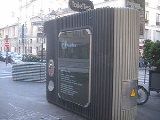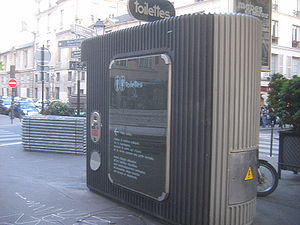
Pay toilet
Encyclopedia

Money
Money is any object or record that is generally accepted as payment for goods and services and repayment of debts in a given country or socio-economic context. The main functions of money are distinguished as: a medium of exchange; a unit of account; a store of value; and, occasionally in the past,...
payment
Payment
A payment is the transfer of wealth from one party to another. A payment is usually made in exchange for the provision of goods, services or both, or to fulfill a legal obligation....
of any individual to use. It may be street furniture
Street furniture
Street furniture is a collective term for objects and pieces of equipment installed on streets and roads for various purposes, including traffic barriers,...
or be inside a building, e.g. a mall
Shopping mall
A shopping mall, shopping centre, shopping arcade, shopping precinct or simply mall is one or more buildings forming a complex of shops representing merchandisers, with interconnecting walkways enabling visitors to easily walk from unit to unit, along with a parking area — a modern, indoor version...
, department store
Department store
A department store is a retail establishment which satisfies a wide range of the consumer's personal and residential durable goods product needs; and at the same time offering the consumer a choice of multiple merchandise lines, at variable price points, in all product categories...
, railway station, restaurant
Restaurant
A restaurant is an establishment which prepares and serves food and drink to customers in return for money. Meals are generally served and eaten on premises, but many restaurants also offer take-out and food delivery services...
, etc. The reason for charging money for using toilets usually is for the maintenance of the equipment.
History
Pay toilets are common in EuropeEurope
Europe is, by convention, one of the world's seven continents. Comprising the westernmost peninsula of Eurasia, Europe is generally 'divided' from Asia to its east by the watershed divides of the Ural and Caucasus Mountains, the Ural River, the Caspian and Black Seas, and the waterways connecting...
. Paris
Paris
Paris is the capital and largest city in France, situated on the river Seine, in northern France, at the heart of the Île-de-France region...
, in particular, makes heavy use of them; the streets of the city are forested with self-cleaning coin
Coin
A coin is a piece of hard material that is standardized in weight, is produced in large quantities in order to facilitate trade, and primarily can be used as a legal tender token for commerce in the designated country, region, or territory....
operated booths (landmarks like Basilique du Sacré-Cœur generally have several). Riders on the Metro
Paris Métro
The Paris Métro or Métropolitain is the rapid transit metro system in Paris, France. It has become a symbol of the city, noted for its density within the city limits and its uniform architecture influenced by Art Nouveau. The network's sixteen lines are mostly underground and run to 214 km ...
may encounter coin-op toilets in the underground stations; and even non-mechanized toilets occasionally have attendants who accept tips. Some service stations offer a coupon equal in value to the amount paid for use of a toilet, redeemable for other goods at that station or others in the same chain
Chain store
Chain stores are retail outlets that share a brand and central management, and usually have standardized business methods and practices. These characteristics also apply to chain restaurants and some service-oriented chain businesses. In retail, dining and many service categories, chain businesses...
.
The first pay toilet in the United States was installed in 1910 in Terre Haute, Indiana
Terre Haute, Indiana
Terre Haute is a city and the county seat of Vigo County, Indiana, United States, near the state's western border with Illinois. As of the 2010 census, the city had a total population of 60,785 and its metropolitan area had a population of 170,943. The city is the county seat of Vigo County and...
.
Decline
In the United States, pay toilets were common until the mid-1970s, and most frequently seen at transportation terminals (airports, train and bus stations) and sporting venues. They came under attack not only from feminists but also the plumbing industry. California legislator March Fong EuMarch Fong Eu
March Kong Fong Eu is an American politician of the Democratic Party.Fong earned a Bachelor of Science in dentistry from the University of California, Berkeley in 1943 and a Master of Arts from Mills College. She earned a Ed.D...
(later secretary of state of California) smashed a toilet bowl on the steps of the state capitol as part of her campaign against pay toilets. She argued they discriminated against women because men could use urinals for free whereas women always had to pay a dime for a toilet stall in places where payment was mandatory. The American Restroom Association was a proponent of an amendment to the National Model Building Code to allow pay toilets only in addition to free toilets. A campaign by the Committee to End Pay Toilets In America
Committee to End Pay Toilets in America
The Committee to End Pay Toilets in America, or CEPTIA, was a 1970s grass-roots political organization which was one of the main forces behind the elimination of pay toilets in many American cities and states.-History:...
(CEPTIA) resulted in laws prohibiting pay toilets in cities and states
U.S. state
A U.S. state is any one of the 50 federated states of the United States of America that share sovereignty with the federal government. Because of this shared sovereignty, an American is a citizen both of the federal entity and of his or her state of domicile. Four states use the official title of...
. In 1973, Chicago became the first American city to enact a ban, at a time when, according to the Wall Street Journal, there were at least 50,000 units in America, mostly made by the Nik-O-Lok Company. CEPTIA was successful over the next few years in obtaining bans in New York, New Jersey, Minnesota, California, Florida and Ohio. Lobbying was successful in other states as well, and by decade's end, pay toilets were greatly reduced in America. However, they are still in use and produced by the Nik-O-Lok company
Nik-O-Lok Company
The Nik-O-Lok Company is a company founded in 1910 with headquarters in Indianapolis, Indiana, that manufactures and leases door locks for pay toilets. Locks are designed that can be operated by manufacturer-supplied tokens or by coins as well as tokens....
as many of these laws have since been repealed.
However, in Canada, pay toilets have been gradually been eliminated as some men arrested for having sex in a pay toilet were acquitted as the defence successfully argued that having paid for the toilet booth, the two men were basically in a form of hotel accommodation, thus cancelling the public lewdness charge.
Some businesses use the payment system to limit access to toilets, and this can be accomplished by use of a key system for patrons only and outright denial of access to the wider public. A token operated lock has the same access limiting ability without the nuisance/expense of lost keys from patrons not returning them after use. A quarter or token/quarter operated lock is also available and is used to defray costs of water, paper, maintenance, etc. Pay toilet locks are now installed on the restroom entry doors (rather than the individual stalls) and therefore provide equal access for both men's and women's restrooms.
Around the world
In ArgentinaArgentina
Argentina , officially the Argentine Republic , is the second largest country in South America by land area, after Brazil. It is constituted as a federation of 23 provinces and an autonomous city, Buenos Aires...
, pay toilets are uncommon. Usually toilets placed in public places are free to use but the janitor is seated outside with a dish by his side expecting a tip from the customer. They often have a sign saying "Su propina es nuestro sueldo" (your tip is our salary). It is accustomed to give them a coin or a $2 bill, specially if you are going to use the toilets and require paper.
In Mexico
Mexico
The United Mexican States , commonly known as Mexico , is a federal constitutional republic in North America. It is bordered on the north by the United States; on the south and west by the Pacific Ocean; on the southeast by Guatemala, Belize, and the Caribbean Sea; and on the east by the Gulf of...
, the majority of pay toilets have turnstile
Turnstile
A turnstile, also called a baffle gate, is a form of gate which allows one person to pass at a time. It can also be made so as to enforce one-way traffic of people, and in addition, it can restrict passage only to people who insert a coin, a ticket, a pass, or similar...
s and an attendant at the entrance. The attendant gives out toilet paper and sometimes a paper towel.
In Singapore
Singapore
Singapore , officially the Republic of Singapore, is a Southeast Asian city-state off the southern tip of the Malay Peninsula, north of the equator. An island country made up of 63 islands, it is separated from Malaysia by the Straits of Johor to its north and from Indonesia's Riau Islands by the...
, pay toilets are still common in "Hawker Centers", the use of the toilet usually costs 10¢.
In some areas of Taiwan
Republic of China
The Republic of China , commonly known as Taiwan , is a unitary sovereign state located in East Asia. Originally based in mainland China, the Republic of China currently governs the island of Taiwan , which forms over 99% of its current territory, as well as Penghu, Kinmen, Matsu and other minor...
, mostly in subways, one must pay for the toilet paper, but the toilet itself is free.
In the United Kingdom
United Kingdom
The United Kingdom of Great Britain and Northern IrelandIn the United Kingdom and Dependencies, other languages have been officially recognised as legitimate autochthonous languages under the European Charter for Regional or Minority Languages...
, it is technically permitted to charge for use of toilets, but not for the use of urinals. Pay toilets on the streets may provide urinals free of charge to prevent public urination.
See also
- OuthouseOuthouseAn outhouse is a small structure separate from a main building which often contained a simple toilet and may possibly also be used for housing animals and storage.- Terminology :...
- Portable toiletPortable toiletPortable toilet are simple portable enclosures containing a chemical toilet which are typically used as a temporary toilet for construction sites and large gatherings and events. Most of the portable toilets have black open-front-U-shaped toilet seat with cover...
- SanisetteSanisetteSanisette is a registered trademark for a self-contained, self-cleaning, unisex, public toilet pioneered by the French company JCDecaux. These toilets are a common sight in several major cities of the world, but they are perhaps most closely associated with the city of Paris, where they are...
- ToiletToiletA toilet is a sanitation fixture used primarily for the disposal of human excrement, often found in a small room referred to as a toilet/bathroom/lavatory...
- Urinal
- Water closet
- UrinetownUrinetownUrinetown: The Musical is a satirical comedy musical, with music by Mark Hollmann, lyrics by Hollmann and Greg Kotis, and book by Kotis. It satirizes the legal system, capitalism, social irresponsibility, populism, bureaucracy, corporate mismanagement, and municipal politics...
- Committee to End Pay Toilets in AmericaCommittee to End Pay Toilets in AmericaThe Committee to End Pay Toilets in America, or CEPTIA, was a 1970s grass-roots political organization which was one of the main forces behind the elimination of pay toilets in many American cities and states.-History:...

